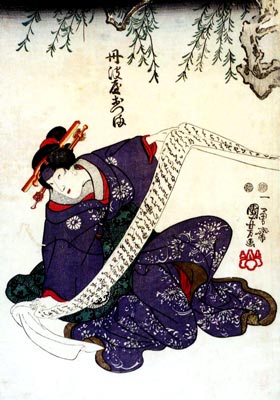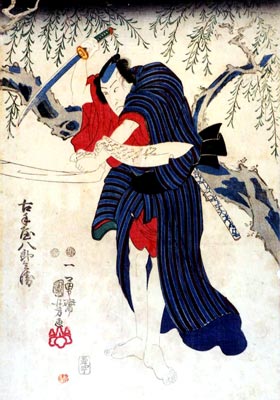| UNAGIDANI |
| Play title | Unagidani Sakuratsuba Urami no Samezaya |
| Authors | Unknown |
| History |
This drama, which is commonly called "Unagidani" or "Otsuma Hachirobę", is based on a real incident, which occured in Ôsaka in the 7th lunar month of 1702 in the district of Unagidani. It was almost immediately adapted for Kabuki and staged in Ôsaka three major theaters. The thema was revived in the 7th lunar month of 1731 with the drama "Fumizuki Urami no Kiriko", which was produced by Iwai Hanshirô III at the Naka no Shibai. Another event, the murder of a courtesan named Wakano in Ôsaka in 1764, led to a new production using the same title "Fumizuki Urami no Kiriko", which was staged in the 8th lunar month of 1764 at the Naka no Shibai, starring Nakamura Kumetarô I, Mimasu Daigorô I and Arashi Shichigorô II in the roles of Otsuma, Hachirobę and Yahei. The puppet theater got its own version, written by Yatami Heishichi, which was entitled "Tsuma Gasane Naniwa no Hachimonji" and staged for the first time in the 2nd lunar month of 1769 at the Takemotoza. Another version of the story of Otsuma and Hachirobę for the puppets, entitled "Sakuratsuba Urami no Samezaya", was staged in the 11th lunar month of 1774 at the Toyotakeza. The most popular scene of this drama, commonly called "Unagidani", was later on adapted for Kabuki. It was successfully revived by Kataoka Gatô III in May 1894 at the Minamiza. The star decided to add it to his collection of favourite roles (Kataoka Jűnishű). |
| Key words | Sewamono Enkirimono Otsuma-hachirobęmono Kataoka Jűnishű Unagidani Furuteya Dôguya |
| Summary |
Hachirobę, an ex-samurai dealer in second-hand articles (furuteya), is in need of money to achieve the recovery of a treasured sword stolen from his former master's house. To help him acquire the necessary sum of money his wife Otsuma, after consultation with her mother but without Hachirobę's knowledge, decides to divorce him and marry Yahei, a rich curio dealer (dôguya), who has promised to give her 50 ryô. In Hachirobę's absence Yahei comes to his house with the go-between Jűbę. When Hachirobę returns with a cake for his little daughter Ohan, Otsuma and her mother tell him that Otsuma is going to marry Yahei. Hachirobę tries to attack Otsuma but is interrupted by Yahei who, claiming that Otsuma is his wife, threatens to kill him if he assaults her. As Hachirobę goes out of the house without further ado Yahei thrusts Ohan out into the street and asks Otsuma to go to bed with him. Hachirobę soon comes back and, furious at finding Ohan left out in the cold, bursts into the house and slashes both Otsuma and her mother to death. Yahei barely escapes with his life. Hachirobę tries to commit suicide but is dissuaded by Ohan and Gimpachi, a friend of Hachirobę's who has come to see him. Ohan then recites a verbal will of the illiterate Otsuma, which she has trained Ohan to memorize. Hachirobę now learns, all too late, of Otsuma's faithfulness to him and her pretended marriage for the sake of getting money for him. Hachirobę also learns through Yahei's letter left behind by him that Yahei has stolen the sword Hachirobę has been seeking. Source: Hironaga Shűzaburô |
 |
 |
|
The actors Onoe Kikujirô II and Nakamura Utaemon IV playing the roles of Otsuma and Hachirobę in the drama "Adanaen Ukina no Koiguchi", which was staged in the 5th lunar month of 1848 at the Nakamuraza (print made by Utagawa Kuniyoshi) |
|
|
|
| Contact | Main | Top | Updates | Actors | Plays | Playwrights | Programs | Links | FAQ | Glossary | Chronology | Illustrations | Prints | Characters | Derivatives | Theaters | Coming soon | News |